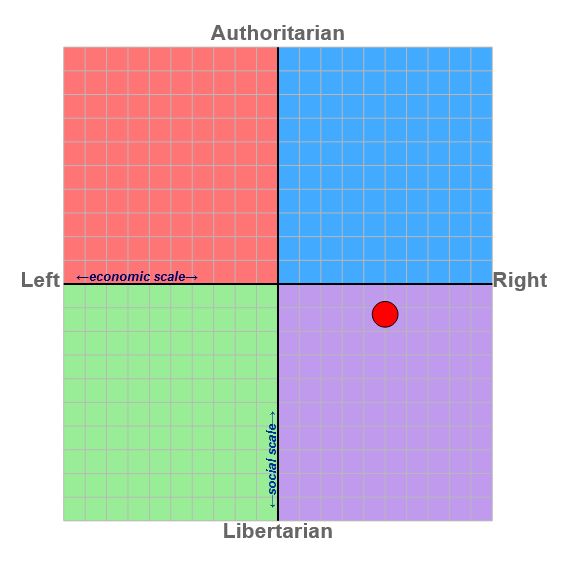Given the observation that all Internet surveys on the topics of politics and economics will inevitably prove that you’re a libertarian, I nevertheless took this test:

My problem with these kinds of surveys is that questions are often posed demanding an either/or response, or else the question steers you towards a choice that isn’t really a choice
Here’s one example, in fact the very first question:
If economic globalisation is inevitable, it should primarily serve humanity rather than the interests of trans-national corporations.
If economic globalization occurs, it will largely be brought about by government and transnational corporations. Expecting either to protect or enhance the interests of “humanity” is naïve beyond belief, because globalization is sought either for control (government) or profit (corporations). You can’t actually answer that question inside an Agree / Disagree matrix. But because the role of governments is ignored in the question, you’re forced into supporting transnational corporations or opposing them — a false dichotomy because in some cases, a uniform model is good (banking) or terrible (gun control). (I know: gun control isn’t an economic issue, unless one ignores H.L. Menken’s observation that when politicians talk, regardless of topic, it’s always about money.)
Here’s another:
Our race has many superior qualities, compared with other races.
Define “race”. Are we using the classical definitions (e.g. Western-European, Sino-Japanese, Middle-Eastern) or the modern one (Black / White / Yellow / Other)? The White “race” is superior to the Black race when it comes to things like fine art, architecture or the rule of law, but are those even “qualities”? Once again, the survey-taker is left to decide what we’re talking about here, but in this case you can’t combine disparate definitions and opinions when using vague terminology.
One more example:
Controlling inflation is more important than controlling unemployment.
Those are incomparable conditions, because neither is a cause or a consequence, nor are they relatable. And “more important” to whom, exactly?
Having worked in the research business for over a quarter-century, I’ve designed literally hundreds of surveys, and found the “agree/disagree” format to be profoundly inferior to discrete / conjoint analysis — the latter involving a set of choices on the same topic, e.g.
Which do you prefer:
Option A or Option B?
Option B or Option C?
Option A or Option C?
The problem with conjoint methodology is that it’s more difficult to set up and to analyze, so lazy researchers (i.e. most of them) tend to go with the simpler binary structure.
Life, unfortunately, is seldom binary (unless you are a computer, totalitarian, religious zealot, libertarian or idiot — some overlap). The real world is more complex than that, which is why setting economics and social issues on a simple XY axis will almost always lead you to discover that Aha! you too are a libertarian, or would be if you could.
In fact, I have found that I tend more to the authoritarian side of the scale because I have to acknowledge that some form of outside control is sometimes necessary — protection of private property and streetlights being the simplest ones to imagine — but it can equally be deplorable (e.g. Judenfrei Nazi Art).
Nuance: we all have it, in varying degrees, except to most survey-takers.
Please note that I’ve erred on the side of simplicity in the above, because nothing causes a MEGO reaction like a discussion of statistical methodology. (MEGO: my eyes glaze over.)

I took this same test recently. I think instapundit linked to a story from John Hinderaker. I found several questions manipulative or defective, including the ones you address. I agree that such tests usually fail to deal well with the real world (kind of like most Libertarians). Two dimensional representations of political theory are better than the simplistic one dimensional left-right spectrum, but to better portray the real world would require more dimensions and would soon get too complicated to visualize.
These tests are way too simplistic and you’re right too many of the questions are absurd.
I take this political test to be very similar to what color is your underwear, add to what you ate last and what day of the month were you born now put them together and you get your Christmas Elf/stripper/rapper name.
Just did that test.
My result is slightly (less than 1/2 a square) southwest from yours.
About half the questions felt like they were boxing me in.
Hmmm….boxing him in….that sounds more like a test made by communists.
There is very little practical difference between communists and libertarians.
Both want a state in which a small autocracy decides everything “for the good of the people”, they just have different ideas about who should be in charge.
For libertarians it’s basically themselves, as they see themselves as the biggest baddest bullies out there who therefore have a God given right to lay down the law on everyone else while themselves doing as they wish.
For communists it’s also themselves, because they consider themselves to be the sole source of wisdom and know what’s best for everyone else.
Different reasoning, same outcome: brutal oppression of everyone who’s not part of the elite.
All the online tests in this vein I’ve seen are pretty silly. Nevertheless they can be entertaining if not particularly informative. One this particular test I scored in the same place as you did so, from one great mind to another: Good job.
Alarmingly, scored almost exactly the same as you Kim.
All those online tests really do is tell you where theauthor thinks the centre should be.
All those online tests really do is tell you where the author thinks the centre should be.